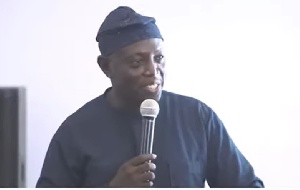Business News of Thursday, 24 April 2025
Source: www.ghanawebbers.com
Ghana is not broke, it is bleeding- UPSA’s Prof. Boadi calls for bold action on tax leakages
Associate Professor Isaac Boadi is the Dean of the Faculty of Accounting and Finance at the University of Professional Studies, Accra (UPSA). He recently discussed Ghana’s financial situation. He described it as a result of systemic losses, not bankruptcy.
Prof. Boadi spoke at a forum on tax revenue leakages in Ghana. He emphasized that urgent action is needed to address these issues. “Ghana is not broke. Ghana is bleeding,” he stated. He added that this issue transcends political parties; it’s about fighting corruption.
He noted that Ghana loses about GH₵9 billion each year. This loss stems from corruption, tax evasion, and smuggling across various sectors.
These figures represent real consequences for Ghanaians. They indicate missed opportunities and human suffering. “These figures are not just numbers,” he said, highlighting unbuilt classrooms and unavailable medicines.
Sector-by-Sector Breakdown of Fiscal Leakages
Prof. Boadi provided estimates of losses in key sectors:
- Tax Administration: GH₵3 billion lost annually due to illicit financial flows.
- Customs and Trade: The World Bank reports over GH₵550 million lost yearly from import-related corruption.
- Gold Mining: In 2022, losses reached GH₵2 billion, with many small-scale miners evading taxes.
- Oil and Gas: OPEC reported GH₵1.5 billion in unaccounted revenues linked to production-sharing agreements.
- Cocoa Smuggling: Approximately GH₵150 million lost annually due to smuggling activities.
- Forestry: Illegal logging costs about GH₵250 million yearly in unpaid timber royalties.
- Public Procurement: Auditor-General reports show over GH₵170 million lost due to inefficiencies.
- Fertiliser Subsidy Programme: Roughly GH₵100 million lost yearly to fertiliser smuggling.
- Port and Harbours: Corruption leads to an estimated GH₵250 million loss annually through unpaid duties.
- Informal Sector: With 80% of the workforce informal, Ghana loses an additional GH₵15.6 million in untapped tax revenue.
Root Causes and Consequences
Prof. Boadi identified four main causes for these leakages: weak enforcement, outdated systems, institutional collusion, and lack of transparency.
He warned that failing to address these issues could worsen public services and increase youth unemployment. It may also lead to a deeper debt crisis.
“The loopholes are exploited by both petty criminals and powerful corporations,” he said.
The Way Forward
In his closing remarks, Prof. Boadi called on all stakeholders—government, private sector, and citizens—to take action.
He proposed four urgent interventions:
1. Digitalise revenue collection systems: “We cannot tackle 21st-century challenges with 20th-century tools.”
2. Impose strict sanctions for offenders: “Without consequences, corruption becomes profitable.”
3. Ensure transparency in public finance: “Every Ghanaian must track how every cedi is raised and spent.”
4. Formalise the informal sector: “Bringing more economic actors into the tax net is essential.”
He concluded with a strong message: “The data is clear. The victims are real.” Solutions require courage from everyone involved.











